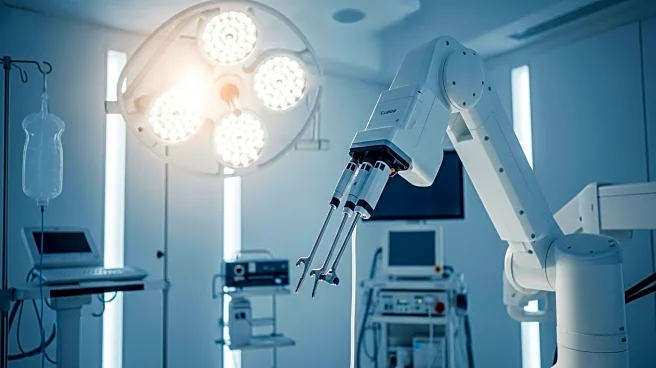What's Happening?
A child-sized robot named Astra is being employed at Astra Vascular, a vein treatment clinic in New York City, primarily for promotional purposes. The robot, controlled by Dr. George Bolotin, walks around the neighborhood as a mobile advertisement, interacting with passersby by waving and handing out flyers. Dr. Bolotin, a vascular specialist and technology enthusiast, purchased Astra for $20,000 and envisions a future where the robot could assist in surgical procedures. Currently, Astra is a prototype with limited capabilities, performing basic tasks such as telling jokes and sprinting at 3 miles per hour. Bolotin anticipates that future software updates will enhance Astra's functionality, potentially allowing it to operate autonomously and assist in the operating room, thereby reducing the need for human staff.
Why It's Important?
The integration of robots like Astra in medical settings highlights the growing role of technology in healthcare. This development could lead to increased efficiency and reduced staffing challenges in clinics, as robots can perform repetitive tasks without fatigue. However, it also raises concerns about job displacement and the ethical implications of autonomous machines in sensitive environments like operating rooms. The potential for hacking and misuse of robotic technology is another critical issue, as highlighted by Dr. Bolotin's concerns about security. As healthcare continues to evolve with technological advancements, stakeholders must address these challenges to ensure safe and effective implementation.
What's Next?
Dr. Bolotin plans to continue using Astra for promotional activities while exploring its potential for surgical assistance. Future software updates are expected to enhance Astra's capabilities, possibly leading to its autonomous operation in medical procedures. This progression may prompt discussions among healthcare professionals and policymakers regarding the regulation and ethical use of robots in clinical settings. Additionally, public perception and acceptance of robotic assistance in healthcare will play a significant role in determining the extent of its integration.
Beyond the Headlines
The use of robots like Astra in healthcare settings could signify a broader shift towards automation in various industries. This trend may lead to significant changes in workforce dynamics, requiring new skills and training for human workers to collaborate effectively with robotic systems. Ethical considerations, such as accountability in case of errors or malfunctions, will become increasingly important as robots take on more complex roles. The cultural impact of robots in everyday life, as seen in public reactions to Astra, may also influence societal attitudes towards technology and innovation.









